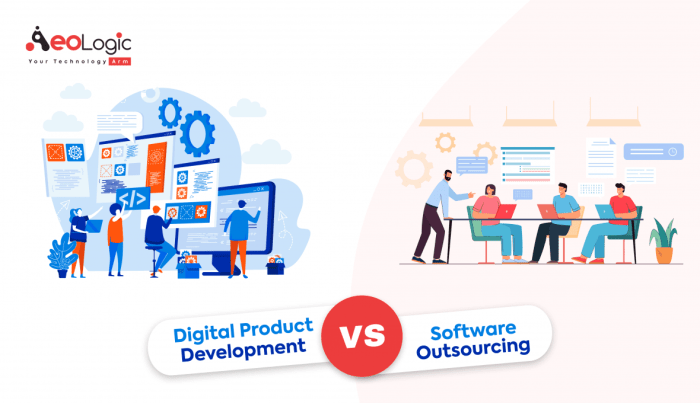In today’s rapidly evolving technological landscape, businesses are increasingly turning to outsourcing software product development to gain a competitive edge. This strategy offers numerous benefits, from cost savings and access to specialized expertise to accelerated time-to-market. However, navigating the complexities of outsourcing requires careful planning and a thorough understanding of the process. This comprehensive guide delves into the intricacies of outsourcing software development, providing insights to help you make informed decisions.
Understanding the Benefits of Outsourcing Software Development
Outsourcing software development isn’t just about cutting costs; it’s about strategically leveraging external resources to achieve specific business objectives. The key advantages include:

Cost Reduction
- Lower labor costs: Outsourcing to regions with lower labor costs significantly reduces development expenses, freeing up capital for other strategic initiatives.
- Reduced overhead: Businesses avoid the costs associated with hiring, training, and managing an in-house development team, including office space, equipment, and benefits.
- Predictable budgeting: Outsourcing often involves fixed-price contracts, providing greater budget predictability and control.
Access to Specialized Expertise
- Specialized skills: Access a global talent pool with specialized skills and expertise in niche technologies that may be unavailable locally.
- Faster project completion: Experienced outsourcing teams can often complete projects faster due to their established processes and expertise.
- Enhanced innovation: Collaboration with diverse teams can foster innovation and lead to creative solutions.
Accelerated Time-to-Market
- Faster development cycles: Dedicated outsourcing teams can work concurrently on different aspects of the project, accelerating the development process.
- Reduced time-to-launch: Quickly bring your software product to market, gaining a first-mover advantage.
- Increased agility: Easily scale your development team up or down based on project needs, ensuring agility and responsiveness to market changes.
Focus on Core Business Activities
- Free up internal resources: Outsourcing frees up internal teams to focus on core business activities and strategic initiatives.
- Improved efficiency: Streamline operations and improve overall efficiency by delegating non-core functions.
- Increased productivity: Internal teams can dedicate their time and energy to tasks that directly contribute to the company’s bottom line.
Choosing the Right Outsourcing Model
Several outsourcing models cater to different needs and preferences. Understanding these models is crucial for selecting the best fit for your project:
Dedicated Development Team
This model involves building a dedicated team of developers who work exclusively on your project. It provides close collaboration and control but may require a larger upfront investment.
Project-Based Outsourcing
This model is suitable for specific projects with defined scopes and timelines. It offers flexibility and cost-effectiveness for smaller projects.

Outstaffing
This model involves hiring individual developers or specialists from an outsourcing company to augment your in-house team. It provides flexibility and access to specific expertise as needed.
Selecting a Reliable Software Development Outsourcing Partner
Choosing the right partner is paramount to the success of your project. Consider these factors:
Experience and Expertise
- Portfolio review: Examine the outsourcing company’s portfolio to assess their experience and expertise in relevant technologies and industries.
- Client testimonials: Seek feedback from previous clients to gauge their satisfaction and the quality of service provided.
- Technology stack alignment: Ensure the outsourcing partner possesses the necessary expertise in the technologies you require for your project.
Communication and Collaboration
- Clear communication channels: Establish clear communication channels and protocols to ensure effective collaboration and information flow.
- Time zone compatibility: Consider the time zone difference to ensure seamless communication and collaboration.
- Cultural understanding: Choose a partner with a good understanding of your culture and business practices.
Quality Assurance and Security
- Quality assurance processes: Verify the outsourcing partner’s quality assurance processes and methodologies to ensure the delivery of high-quality software.
- Data security measures: Assess the partner’s data security measures and compliance with relevant regulations.
- Intellectual property protection: Ensure the partner has robust measures in place to protect your intellectual property.
Contractual Agreements
- Clear contract terms: Ensure the contract clearly Artikels the scope of work, payment terms, timelines, and intellectual property rights.
- Dispute resolution mechanisms: Include clear mechanisms for resolving disputes and disagreements.
- Legal review: Have the contract reviewed by legal counsel to protect your interests.
Managing the Outsourcing Process Effectively
Effective management is crucial for a successful outsourcing experience:
Project Management
- Define clear project requirements: Clearly define project requirements, deliverables, and timelines.
- Regular communication: Maintain regular communication with the outsourcing team through meetings, progress reports, and other channels.
- Performance monitoring: Monitor the outsourcing team’s performance and address any issues promptly.
Risk Mitigation
- Identify potential risks: Identify potential risks associated with outsourcing, such as communication barriers, cultural differences, and security breaches.
- Develop mitigation strategies: Develop strategies to mitigate identified risks.
- Contingency planning: Have a contingency plan in place to address unforeseen circumstances.
Cultural Considerations
- Cultural awareness: Be aware of cultural differences and adapt your communication style accordingly.
- Build trust and rapport: Build strong relationships with the outsourcing team to foster trust and collaboration.
- Respect cultural norms: Show respect for the cultural norms and practices of the outsourcing team.
Frequently Asked Questions (FAQ)
- Q: How much does software development outsourcing cost? A: The cost varies greatly depending on factors like the project’s complexity, the location of the outsourcing team, and the technologies used. It’s best to get detailed quotes from potential partners.
- Q: How do I ensure the quality of the outsourced software? A: Implement robust quality assurance processes, including regular testing, code reviews, and clear acceptance criteria. Choose a partner with a proven track record of delivering high-quality software.
- Q: What are the risks associated with outsourcing software development? A: Risks include communication barriers, cultural differences, intellectual property theft, security breaches, and potential quality issues. Thorough due diligence and careful contract negotiation can mitigate these risks.
- Q: How do I choose the right outsourcing company? A: Consider factors like experience, expertise, communication skills, quality assurance processes, data security measures, and client testimonials. Conduct thorough research and request references.
- Q: What are the different types of outsourcing models? A: Common models include dedicated development teams, project-based outsourcing, and outstaffing. The best model depends on your project’s specific needs and requirements.
Conclusion
Outsourcing software product development offers significant advantages for businesses of all sizes. By carefully considering the factors discussed in this guide, you can effectively leverage the benefits of outsourcing while mitigating potential risks. Remember that thorough planning, diligent partner selection, and effective project management are crucial for a successful outsourcing experience.
Outsourcing software product development offers numerous benefits, including access to specialized talent and cost savings. A popular approach within this model is leveraging nearshore software development for mobile apps , which combines the advantages of geographical proximity with potentially lower costs than onshore options. Ultimately, successful outsourcing hinges on careful selection of the right partner to meet specific project needs.
References
- Accenture Software Engineering
- Gartner on Outsourcing
- Forbes on Choosing a Software Development Outsourcing Partner
Call to Action
Ready to explore the benefits of outsourcing your software development project? Contact us today for a free consultation and let’s discuss how we can help you achieve your business goals.
